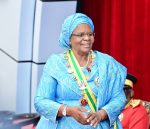TotalEnergies, the global energy giant sitting on the potentially transformative Venus oil discovery offshore Namibia, has signalled that significant further talks with the newly inaugurated Namibian government are essential before it can commit to developing the project. While acknowledging the government’s ambitious target of first oil before 2030, CEO Patrick Pouyanne stressed the need for “very strong alignment” and “good understanding,” drawing direct parallels to the company’s cautious approach in neighbouring Mozambique.
The comments, made during TotalEnergies’ second-quarter earnings call, place Namibia firmly at the centre of the company’s southern African strategy but underscore the complex negotiations and mutual understanding required before multi-billion dollar investments in frontier regions can proceed.
Venus: Alignment before investment
Pouyanne confirmed that TotalEnergies is “ready” technically and commercially to develop the Venus discovery, located in the Orange Basin. However, he emphasized a critical precondition: ensuring profound alignment with Namibia’s new administration
“They would like the oil to be produced before the end of 2029,” Pouyanne stated, referencing government expectations. “So that means that we should take decisions this year, before the end of 2025, if we want to meet the target. This is what we [need to] explain to them.”
The CEO elaborated on the necessity of this dialogue: “It’s a little like Mozambique. You have a new country to the oil industry, so it’s important to ensure the alignment, the good understanding.” This alignment, Pouyanne suggested, encompasses a shared vision for the project’s scope, timeline, fiscal terms, local content participation, and the broader regulatory framework governing Namibia’s nascent oil and gas sector. TotalEnergies needs assurance that the investment environment is stable, predictable, and mutually beneficial before giving the final green light.
The Mozambique parallel: Lessons in patience and partnership
The reference to Mozambique is highly significant. TotalEnergies’ $20 billion Mozambique LNG project, situated in the restive northern Cabo Delgado province, has been suspended since 2021 due to insurgent attacks. Restarting this mammoth venture is also contingent on Pouyanne’s principle of “very strong alignment” between the government and investors.
“I said summer. Summer ends on September 19, so give me time,” Pouyanne told analysts when pressed on the Mozambique restart timeline, following a meeting with President Filipe Nyusi earlier in July. This demonstrates the company’s firm stance: major investments, especially in regions new to large-scale hydrocarbon development or facing security challenges, require ironclad agreements and shared commitment. The delays and setbacks in Mozambique serve as a stark reminder of the risks involved and the paramount importance of getting the foundational government-company relationship right from the outset. Namibia, while politically stable, represents another “new country” to the deepwater oil industry, demanding a similarly meticulous approach.
Namibia’s oil horizon: Beyond Venus
TotalEnergies’ engagement in Namibia extends beyond its operated Venus block. Pouyanne acknowledged potential interest in Galp’s significant Mopane discovery, also located offshore Namibia, stating, “We’ll see what will happen,” regarding a potential farm-in. This indicates TotalEnergies is actively evaluating opportunities to expand its footprint in the burgeoning Namibian play.
Furthermore, the company plans exploration drilling much closer to Namibian waters next year. Pouyanne revealed intentions to drill “two or three prospects” off South Africa on TotalEnergies’ acreage near the maritime border with Namibia, describing the area as “attractive.” However, he tempered expectations by noting the notoriously lengthy approvals process in South Africa, highlighting a contrast Namibia will be keen to observe.
Global context: Power surges, chemicals slump
The focus on Namibia comes against a backdrop of mixed fortunes for TotalEnergies globally. The company’s integrated power business shone brightly, reporting a 27% year-on-year increase in generation (reaching 12 terawatt hours), driven by new renewable projects and acquisitions. The CEO downplayed immediate impacts from US tax credit changes on their gas-fired plants but noted US offshore wind projects are effectively on hold (“in sleeping mode”).
Conversely, the refining and chemicals sectors faced headwinds. Significant downtime at key refineries in Texas (Port Arthur) and France (Donges) cost approximately $200 million in Q2. A global downturn in chemicals contributed to a 39% year-on-year plunge in operating profits for that division, leading to the planned closure of an ethylene cracker in Antwerp by 2027.
Portfolio reshaping and investor scrutiny
To fund strategic shifts, particularly towards LNG and renewables, TotalEnergies actively managed its portfolio. Divestments in H1 2024, including a stake in Nigeria’s Bonga field sold to Shell, a minority shale interest in Argentina, and undisclosed assets, netted around $3.5 billion. These sales helped offset major acquisitions: stakes in 12 gas-focused blocks offshore Malaysia and Indonesia, and the $1.8 billion purchase of German renewable developer VSB.
Financially, Q2 adjusted net income fell 23% year-on-year to $3.6 billion, meeting market expectations. However, the company’s rising debt level, partly funding an ongoing $2 billion per quarter share buyback program, drew analyst concern. RBC analysts cautioned, “We do not expect investors to reward buybacks that are paid out of balance sheets indefinitely.”
The stakes for Namibia
For Namibia, the development of Venus represents far more than just a major energy project. It holds the potential to be a nation-defining economic catalyst, promising significant government revenue, job creation, infrastructure development, and the potential to position Namibia as a significant energy player. However, realising this potential hinges on the complex dance of negotiation now underway.
TotalEnergies’ insistence on “very strong alignment” underscores the high stakes. The company seeks a stable, predictable, and supportive partnership that mitigates investment risk. The Namibian government, while eager to see production commence swiftly, must negotiate terms that ensure optimal national benefit, robust environmental safeguards, meaningful local participation, and sustainable long-term development.
The clock is ticking towards the implied end-2025 decision deadline for Venus to meet the 2029 first oil target. The coming months will be crucial as both sides engage in the intensive discussions Pouyanne deems “absolutely necessary.” Namibia stands on the cusp of an oil boom; the outcome of these talks will determine the pace, scale, and nature of how that potential is unlocked, shaping the country’s economic trajectory for decades. TotalEnergies has signalled its commitment, but clear, aligned, and mutually understood foundations must be laid first. The world, and especially Namibia, will be watching closely. Pouyanne is expected to provide further insights into TotalEnergies’ strategy, including its Namibian plans, at the company’s annual update in New York on September 29th.










